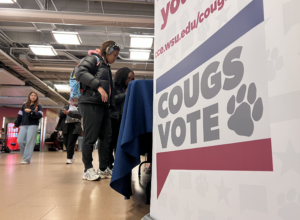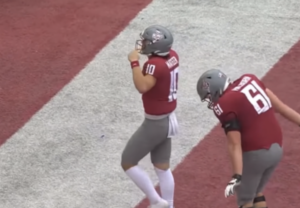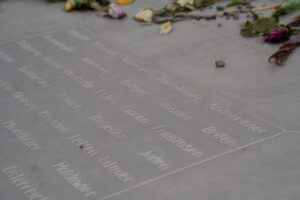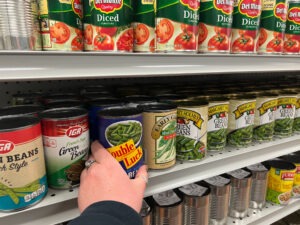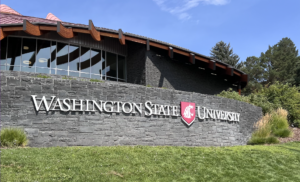PULLMAN, Wash. — For the first time in 15 years, Jocelyn Granados will visit her grandmother in Mexico.
As an immigrant who was brought to the United States at a young age, the Washington State University student will be traveling with a nonprofit higher education program that connects Dreamers with their cultural heritage.
“The thing I’m more excited about is to see my grandma and being able to hug her for the first time in 15 years,” Granados said.

Jocelyn Granados, left, at age 2 when living in San Juan Tepa, Mexico. | PHOTO CREDIT: Jocelyn Granados
Granados is one of more than 800,000 Deferred Action for Childhood Arrivals (DACA) recipients that came to the U.S. as children. She has never been back to Mexico as DACA holders need a special permit called “advance parole” to travel to any country outside the U.S. Through the California-Mexico Studies Center (CMSC), a nonprofit organization that promotes higher education and cultural program, Granados will travel to Mexico for the first time since she left at age 6.
The study abroad program started in 2014 but was paused in 2017 when former President Donald Trump ordered an end to DACA and eliminated advance parole permits. The center had to cancel its study abroad trips, CEO Armando Vazquez Ramos said.
“The last group we took to Mexico with the program was in 2017, but two weeks later the government of former President Trump canceled DACA, and they tried to eliminate the program,” Vazquez said. “We already have 85 applicants ready to go to Mexico.”
Vazquez said many of the Dreamers who applied for the trip that got canceled in 2017 were planning travel to Mexico because they had a family member sick.
Advance Parole is a temporary travel authorization that allows DACA recipients permission to travel outside the U.S. and re-enter lawfully. It is only granted for short trips related for work, education, or humanitarian reasons, according to the U.S. Citizenship and Immigration Services. In December 2020, a New York judge ordered the federal government to restore the DACA program and to begin accepting new applications.
During the 2020 fiscal year, the federal government received more than 400,000 advance parole requests, and it approved 82%, according to the agency.
Vazquez said his program accepted 140 participants from 90 U.S. colleges and universities that will be traveling with the center this year from July 15 to August 8.
“It’s been a personal satisfaction because this trip changed their lives in many ways. They would have never appreciated their parents’ sacrifices,” Vazquez said.
Granados is excited for her trip, but she is also concerned about those who don’t get the opportunity.
“U.S. citizens have the privilege to leave the U.S. any time they want and visit their loved ones, but not DACA recipients,” Granados said. “I think that’s something that breaks my heart every time because I have this temporary protection, but my parents don’t, and I know other people who don’t qualify for DACA…but they also should get these protections.”
In January 2021, President Biden proposed an eight-year path to citizenship for most of the 11 million undocumented immigrants and DACA recipients living in the U.S.
Granados received a scholarship from WSU to help pay for her trip expenses and the advance parole permit fee, but it was challenging to get scholarships.
Kelly Newlon, director of Global Learning at WSU, said she encourages all students regardless of their status to apply for study abroad programs and scholarships.
“We have students study abroad in all seven continents, so for DACA students it has just been more than an individual case by case-bases in terms of us advising,” Newlon said. “And in some cases, students may be able to go to any program that we have to offer… and where they will be comfortable traveling to.”
For Granados, advance parole means more than a travel permit.
“For me, it translates to temporary liberty because it is actually what it is,” Granados said. “Advance parole is essentially giving me permission to leave this country, and hopefully I can come back in with this document, but it is up to the personnel at the border to let me in.”
